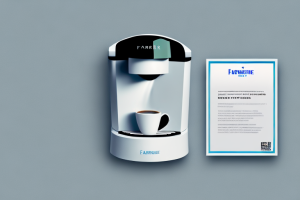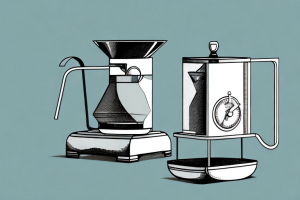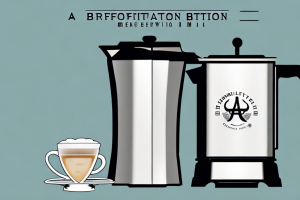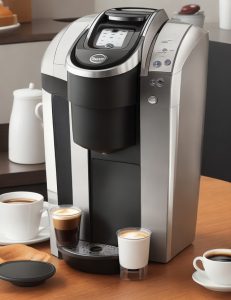Cuisinart Coffee Maker Troubleshoot

A cuisinart coffee maker with a troubleshooting guide
If you are a coffee lover, you know how important it is to have a functioning coffee maker. There’s nothing worse than waking up in the morning, excited to brew a fresh cup of coffee, only to find that your Cuisinart coffee maker is not working as it should. But don’t worry – in this article, we’ll identify common issues with your Cuisinart coffee maker and guide you on how to troubleshoot and solve them.
Identifying Common Issues with Your Cuisinart Coffee Maker:
The first step in troubleshooting your Cuisinart coffee maker is to identify the problem. Here are some common issues that you may encounter with your coffee maker:
1. Your coffee maker won’t brew.
2. Your coffee maker is leaking water.
3. Your coffee maker is clogged.
4. Your coffee maker is not heating up or turning on.
5. Your coffee maker is producing weak coffee or no coffee at all.
Now that you know the common issues with your Cuisinart coffee maker, let’s dive into the different ways you can troubleshoot and solve them.
One possible cause of a coffee maker that won’t brew is a clogged filter. Make sure to clean or replace the filter regularly to prevent this issue. Another possible cause is a malfunctioning heating element, which may need to be replaced.
If your coffee maker is leaking water, check to make sure that the water reservoir is properly seated and that the carafe is properly aligned. If these are not the issue, there may be a crack or other damage to the water tank or tubing, which will require repair or replacement.
If your coffee maker is producing weak coffee or no coffee at all, the issue may be with the coffee grounds. Make sure to use the correct amount of coffee and grind size for your machine. Additionally, check to make sure that the water temperature is correct and that the brewing time is sufficient.
How to Fix a Cuisinart Coffee Maker That Won’t Brew:
If your coffee maker won’t brew, there could be several reasons for this issue. The first thing you should check is if the machine is correctly plugged in and switched on. If it is, then you need to check the water reservoir to ensure that it has enough water to brew your coffee. If there’s an issue with the reservoir, ensure that it is clean and free of debris.
If the reservoir is clean and free of debris, then you should check the coffee maker’s brew basket and ensure that it is correctly aligned and inserted in the machine. You can also try restarting the machine or performing a manual cleaning cycle to clear any clogs that may be affecting your coffee maker.
If none of the above solutions work, then it’s possible that the coffee maker’s heating element is faulty. In this case, you may need to replace the heating element or take the machine to a professional for repair. It’s also important to note that using hard water or not descaling your coffee maker regularly can cause buildup and damage to the machine, leading to brewing issues.
To prevent future issues, make sure to descale your coffee maker regularly and use filtered water. You can also refer to the manufacturer’s instructions for specific cleaning and maintenance recommendations for your Cuisinart coffee maker.
Troubleshooting a Cuisinart Coffee Maker That Leaks:
A Cuisinart coffee maker that leaks is a common issue that can be caused by several factors. One factor is a damaged or cracked water reservoir. Check the reservoir to ensure it’s in good condition. If it’s in good condition, check the brew basket and ensure that it’s correctly inserted in the machine. Additionally, check the drip tray and ensure that it is correctly positioned so that it can collect any spilled coffee.
If none of these steps solve the issue, then you might have to check the machine for any loose or missing parts and replace them as needed. It’s also worth checking the machine’s rubber gasket to ensure that it’s secure and not worn out.
Another possible cause of a Cuisinart coffee maker that leaks is a clogged or dirty water filter. Over time, mineral deposits and coffee oils can build up in the filter, causing it to become clogged. To fix this issue, remove the water filter and clean it thoroughly with warm water and a mild detergent. Allow it to dry completely before reinserting it into the machine.
Finally, if you’ve tried all of these troubleshooting steps and your Cuisinart coffee maker is still leaking, it may be time to contact the manufacturer for assistance. They may be able to provide additional guidance or offer a repair or replacement if necessary.
Understanding the Different Parts of Your Cuisinart Coffee Maker:
Understanding the different parts of your Cuisinart coffee maker can help you troubleshoot and solve any issues you might encounter. Some of the essential parts of your coffee maker include the water reservoir, brew basket, glass carafe, heating plate, control panel, and water filter. It’s important to read the user manual to understand the functions of these parts and learn the correct way to clean and maintain them.
The water reservoir is where you pour the water that will be used to make your coffee. It’s important to fill it up to the correct level to ensure that your coffee is brewed properly. The brew basket is where you place the coffee grounds, and it’s important to use the correct amount of coffee for the amount of water you’re using. The glass carafe is where the brewed coffee is collected, and it’s important to handle it carefully to avoid any spills or breakage.
The heating plate keeps the coffee warm after it’s been brewed, but it’s important to turn it off when you’re done using the coffee maker to avoid any accidents. The control panel allows you to set the brewing time and strength of your coffee, and it’s important to follow the instructions carefully to get the desired results. The water filter helps to remove impurities from the water, which can affect the taste of your coffee, so it’s important to replace it regularly.
Cleaning Tips for Your Cuisinart Coffee Maker:
Maintaining your Cuisinart coffee maker is crucial to ensuring that it lasts longer and works efficiently. Here are some cleaning tips to keep your coffee maker in the best condition:
1. Always remove the used coffee grounds and rinse the brew basket after every use.
2. Regularly clean the carafe, water reservoir, and heating plate with warm water and soap.
3. Decalcify your coffee maker regularly to remove mineral buildup that can affect the machine’s performance.
4. To decalcify your coffee maker, mix equal parts of water and white vinegar and pour the solution into the water reservoir. Turn on the coffee maker and let it run through a full cycle. Then, run two cycles of clean water through the machine to rinse out any remaining vinegar.
Diagnosing and Solving Electrical Issues with Your Cuisinart Coffee Maker:
If your Cuisinart coffee maker is not heating up or turning on, then there could be some electrical issues that need to be addressed. The first thing you should check is the power outlet, cord, and plug to ensure they are all working correctly. If they are, then check the heating element to see if there are any visible signs of damage or wear. In this case, replacing the heating element may be the solution to your problem.
Another common electrical issue with Cuisinart coffee makers is a malfunctioning control board. If your coffee maker is not responding to your commands or is displaying error messages, then the control board may need to be replaced. You can try resetting the control board by unplugging the coffee maker for a few minutes and then plugging it back in. If this does not work, then it may be time to replace the control board.
How to Fix a Clogged Cuisinart Coffee Maker:
If your Cuisinart coffee maker is clogged, there will be a noticeable decrease in water flow and the coffee may taste weak or bitter. To solve this problem, disassemble the brew basket and clean the clogged parts thoroughly. If the machine is still clogged, then try performing a vinegar cleaning cycle to clear out any remaining debris.
Another common cause of a clogged Cuisinart coffee maker is the use of finely ground coffee beans. If you notice that your coffee maker is frequently clogged, try switching to a coarser grind of coffee beans. This will prevent the coffee grounds from getting stuck in the machine and causing a blockage.
It’s also important to regularly clean your Cuisinart coffee maker to prevent clogs from occurring in the first place. After each use, rinse out the brew basket and wipe down the exterior of the machine. Every few weeks, perform a deep cleaning by running a mixture of water and vinegar through the machine. This will help to remove any buildup and keep your coffee maker running smoothly.
Replacing Parts on Your Cuisinart Coffee Maker: A Step-by-Step Guide:
If your Cuisinart coffee maker has a damaged or missing part, it’s important to replace it. Before replacing any part, it’s crucial to understand how to disassemble and reassemble the machine correctly. Follow the user manual closely and ensure that you have the correct replacement part before you start the repair. If you’re not confident in your abilities, it’s best to consult a professional to avoid any further damage.
When replacing parts on your Cuisinart coffee maker, it’s important to use genuine replacement parts from the manufacturer. Using non-genuine parts can cause damage to your machine and may void your warranty. You can purchase genuine replacement parts directly from the manufacturer or from authorized dealers. It’s also important to regularly clean and maintain your coffee maker to prevent the need for frequent part replacements. Refer to the user manual for cleaning and maintenance instructions.
Maximizing the Lifespan of Your Cuisinart Coffee Maker with Regular Maintenance:
Regular maintenance is key to ensuring that your Cuisinart coffee maker lasts longer and works efficiently. Always ensure that the machine is properly cleaned and stored, use high-quality coffee beans to avoid clogging, and avoid overfilling the water reservoir. By following these maintenance tips, you can extend the lifespan of your Cuisinart coffee maker and enjoy fresh, delicious coffee every day.
Conclusion:
There are several common issues that you may encounter with your Cuisinart coffee maker. By identifying the problem and following the troubleshooting steps outlined in this article, you can easily solve most of these issues. By following the maintenance tips, you can ensure that your coffee maker lasts longer and works efficiently for years to come.
Additionally, it is important to regularly replace the water filter in your Cuisinart coffee maker. Over time, minerals and impurities can build up in the filter, affecting the taste and quality of your coffee. By replacing the filter every few months, you can ensure that your coffee is always fresh and delicious.



